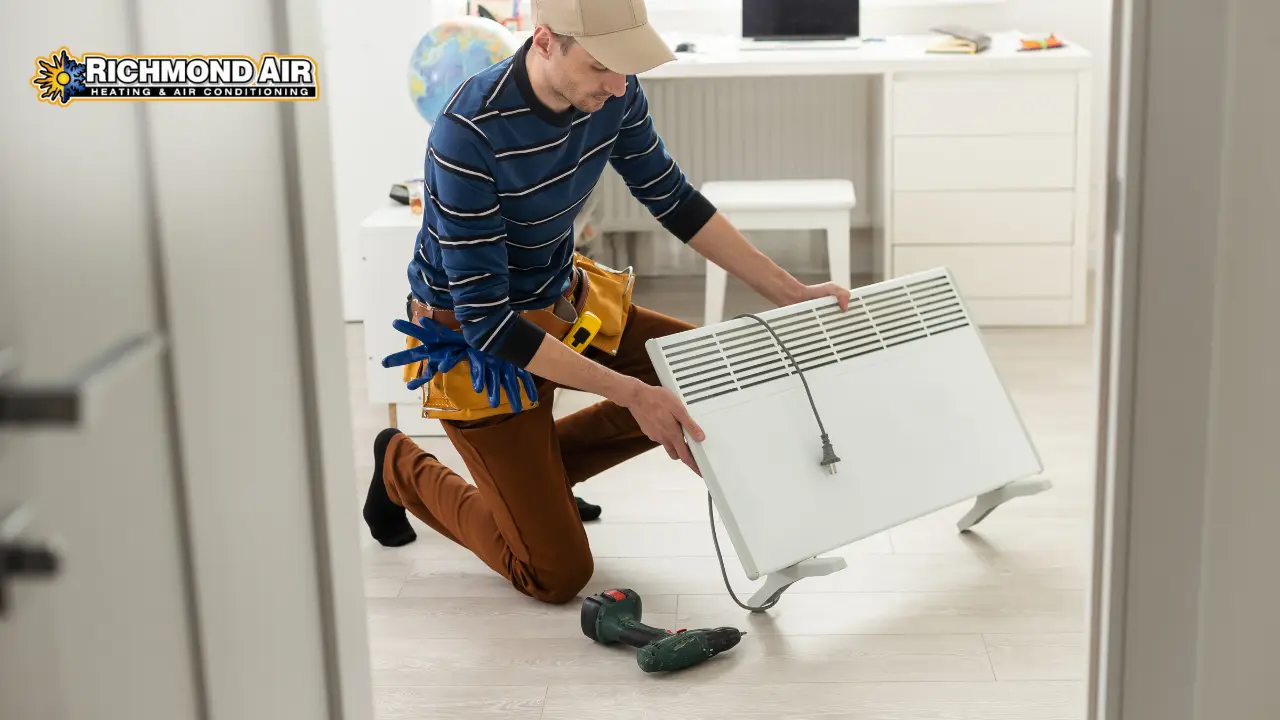You walk into your home, expecting a cozy, warm atmosphere on a chilly evening, and then bam, your heater greets you with a smell that’s less “comforting warmth” and more “fish market.” If you’ve asked yourself, “Why does my heater smell like fish?” you’re not alone. A fishy odor from your heater isn’t just unpleasant; it’s also a potential warning sign of underlying issues. I’ve been there too, trying to figure out what was wrong with my heating system while holding my nose! This unexpected odor can make a simple heating issue seem more intimidating than it actually is. Let’s dive into the common causes of this problem, how to address it, and when it’s time to call in the pros.
Why Does My Heater Smell Like Fish?
A fishy smell from your heater usually means wires or plastic are overheating or melting. This can be unsafe and might cause a fire. Turn it off immediately and get a professional to check it.
What Causes the Heater to Smell Like Fish?

Electrical Overheating
Overheating components, such as wiring, sockets, or circuits, can emit a fish-like odor. This happens when plastic, rubber, or other materials heat up excessively.
- Why it happens: Loose connections, aging parts, or overloaded circuits can cause this.
- What to do: Turn off the heater immediately and inspect for visible damage. Call a professional electrician if you suspect an electrical issue.
Electrical overheating is one of the most common causes of this odor. Ignoring it can lead to severe consequences, including short circuits or even electrical fires. It’s better to be cautious and address the issue as soon as possible.
Burning Dust or Debris
When your heater kicks on after months of inactivity, dust or debris burning off the heating elements may create a strange smell.
- Why it happens: Dust builds up during unused months and burns when the system operates.
- What to do: Regularly clean your heater and schedule annual maintenance to avoid this.
A fishy smell due to dust burning isn’t as dangerous as electrical overheating, but it’s still unpleasant. Routine cleaning and filter replacement can prevent this minor nuisance.
Malfunctioning Heater Components
Some heater parts, like the capacitor or insulation, may degrade over time and emit unpleasant odors.
- Why it happens: Wear and tear or faulty manufacturing.
- What to do: Replace the damaged parts. Regular inspections can help detect these issues early.
Insulation failure, in particular, can create a strong fishy smell. Over time, heat and usage degrade the materials. If this is the case, it’s time to call a professional to inspect the system thoroughly.
How Can I Tell if My Heater Needs Immediate Attention?
If your heater smells fishy and the odor grows stronger or is accompanied by unusual sounds, erratic heating, or tripped breakers, it’s a sign of a serious issue. Turn off the system and seek professional help immediately to ensure safety and prevent potential damage to your home or system.
My Experience With This Odor
A couple of winters ago, my heater decided to surprise me with a smell reminiscent of a seafood market. After an initial panic (and Googling every possibility), I discovered a fried wire in the heater’s control panel. A quick visit from an electrician and some minor repairs saved my system from further damage, and spared me the embarrassment of explaining to guests why my house smelled like fish.
It’s experiences like these that make regular maintenance seem less like a chore and more like an essential part of owning a heating system.
How to Fix a Fish-Smelling Heater
Step 1: Turn It Off
Safety first! If the smell persists, turn off your heater immediately to prevent potential damage or a fire hazard.
Step 2: Check for Visible Issues
Inspect the area around the heater for anything unusual, such as melted wires or burnt debris. Be cautious and avoid touching components unless you’re qualified.
Step 3: Clean and Maintain
Perform routine maintenance:
- Vacuum dust and debris from vents.
- Change air filters regularly.
- Inspect and clean heating elements.
Step 4: Call a Professional
If the smell continues or you can’t identify the source, it’s time to bring in a certified HVAC technician. They can assess the system, replace faulty parts, and restore your heater to safe operation.
Digging Deeper Into Electrical Issues

It’s worth understanding why electrical issues create such an unusual smell. Electrical components are often surrounded by insulating materials like plastic or rubber, which release specific odors when overheated. The fishy smell isn’t coincidental, it’s a warning.
Research shows that faulty wiring is a leading cause of residential fires in the U.S., with many incidents beginning in heating equipment (NFPA, 2022). Even a slight fishy odor can be an early indicator of a potentially hazardous situation.
Prevention Tips
- Regular Maintenance: Schedule annual HVAC check-ups to ensure everything is functioning well.
- Inspect Electrical Wiring: Check for signs of wear or damage, especially in older homes.
- Keep the Area Around the Heater Clear: Avoid placing flammable items near the unit.
It’s always easier (and cheaper) to prevent issues than to fix them later. Routine checks can catch small problems before they escalate into something major.
When Should You Worry?
Not every odd smell is a cause for alarm, but here are some scenarios where immediate action is crucial:
- The smell is strong and persistent.
- You notice visible signs of damage or overheating.
- The heater trips circuit breakers or malfunctions.
Ignoring these signs can lead to costly repairs, or worse, safety hazards like fires.
Get Your Fix
Tired of holding your breath every time you turn on your heater? Don’t let strange smells take over your comfort. Contact Richmond Air for expert tips, trusted repair services, and professional advice to keep your heating system running smoothly. Let us help you create a warm, fresh-smelling home today.
Final Thoughts
A heater smelling like fish is unpleasant, but it’s also your system’s way of telling you something’s off. Whether it’s electrical overheating or a maintenance issue, addressing
it promptly can save you from further inconvenience and potential safety risks. Trust me, I learned the hard way, ignoring the problem doesn’t make it go away. Stay proactive and keep your heater in top condition for a warm and odor-free home.
FAQs
Why does my heater smell like fish only when I first turn it on?
This could be due to dust burning off the heating elements after prolonged inactivity. Regular cleaning and maintenance can help avoid this.
Can I fix a fishy smell from my heater myself?
Minor issues like burnt dust can be resolved by cleaning, but electrical problems or component failures require a professional to ensure safety.
Could the smell mean my heater is unsafe?
Yes, especially if the odor persists. It might indicate electrical overheating or a malfunctioning component, which could pose a fire risk.
How much does it cost to fix a heater with a fishy smell?
Repair costs can vary. Replacing wiring might cost around $150-$300, while larger repairs could be upwards of $500. Always get a professional quote.
Why is the fishy smell stronger in some rooms?
This could indicate that the odor is being circulated unevenly through your vents. Check for blockages in the ductwork or dirty filters, which might trap or amplify smells.
How often should I clean my heater to avoid odors?
Ideally, perform a thorough cleaning every season before turning it on. Regular filter changes (every 1-3 months) can also help reduce odors and improve air quality.


